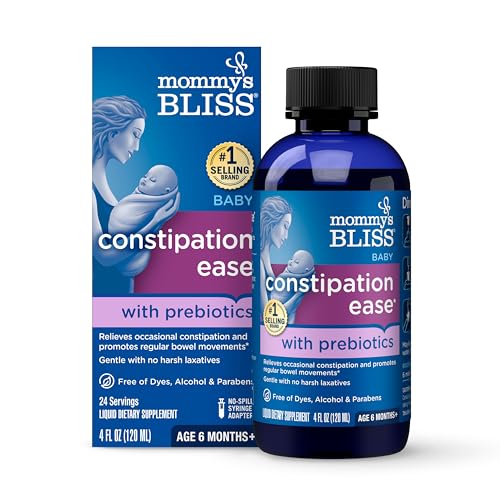As parents, we have all felt the frustration of watching our newborns struggle with constipation, particularly when transitioning to formula. Just picture the comfort of being aware of practical measures to alleviate their discomfort and regulate their bowel movements.
In our guide, we address common concerns and offer effective strategies to support your newborn's digestive health. Let's navigate through these essential steps together, ensuring your little one finds comfort and relief.
Key Takeaways
- Watch for signs of constipation in formula-fed newborns.
- Use gentle techniques to relieve constipation discomfort.
- Adjust formula feeding to promote better bowel movements.
- Seek medical advice for persistent constipation issues.

Frida Baby Windi Gas Passer, Baby Gas Relief, Made in USA, 100% Natural, Safe & Effective Instant Relief for Babies & Infants, 10ct
INSTANT BABY GAS RELIEF: Say goodbye to gassy grimaces with our ingenious hollow tube that works like magic…
As an affiliate, we earn on qualifying purchases.
As an affiliate, we earn on qualifying purchases.
Understanding Newborn Constipation on Formula
If your newborn baby is experiencing constipation while on formula, it's important to understand the reasons behind this common issue. Formula-fed babies are more prone to constipation due to the thicker consistency and larger proteins in formula. Signs of constipation in formula-fed babies include hard stools, infrequent bowel movements, blood in stool, and a tight belly. When switching from breast milk to formula, it can impact poop consistency and lead to digestive issues like constipation. Different types and varieties of formula can affect constipation differently in newborns, so essential to find the right one that suits your baby's needs.
It's vital to avoid using mineral oil, stimulant laxatives, or enemas for constipation in newborns. Instead, consulting a doctor for effective management is recommended. Understanding the impact of formula on your baby's digestive system is the first step towards addressing and alleviating constipation issues, ensuring your little one stays comfortable and healthy.

Mommy's Bliss Constipation Ease + Prebiotics, Relieves Occasional Constipation, Gentle & Safe, No Harsh Laxatives, 4 Fl Oz Bottle (Pack of 1)
Gentle Ingredients: Naturally and gently relieve occasional baby and toddler constipation without any harsh chemical laxatives; Made with…
As an affiliate, we earn on qualifying purchases.
As an affiliate, we earn on qualifying purchases.
Identifying Signs of Constipation in Newborns

Moving on from understanding newborn constipation on formula, let's now focus on recognizing the signs of constipation in newborns. When it comes to identifying signs of constipation in infants, it's crucial to be observant and responsive to their needs. Here are some key indicators to look out for:
- Infrequent bowel movements: Keep an eye on how often your newborn passes stools.
- Hard stools: If the stools are firm and difficult to pass, it could be a sign of constipation.
- Pain during bowel movements: Watch out for any signs of discomfort or straining during bowel movements.
- Tight belly: A tense or bloated belly might indicate constipation in your newborn.

Boogie and Bean Colic Baby Relief, Baby Gas Relief for Infants Tummy Massage Oil; Gas Passer
Colic Baby Belly Massage Oil, specially formulated to provide soothing relief for little ones struggling with colic and…
As an affiliate, we earn on qualifying purchases.
As an affiliate, we earn on qualifying purchases.
Implementing Techniques to Relieve Constipation
To help your newborn relieve constipation while on formula, implementing gentle tummy massages in a clockwise motion can stimulate bowel movements effectively. These massages help to relax your baby's abdominal muscles and encourage the movement of stool through the intestines, aiding in relieving constipation.
Additionally, engaging in bicycle kicks with your baby's legs can assist in moving stool along the digestive tract, alleviating constipation caused by formula.
It's important to make sure your newborn stays hydrated by offering small amounts of water between feedings. Proper hydration softens stools, making them easier to pass and reducing the likelihood of constipation related to formula.
If constipation persists, under the guidance of a healthcare provider, diluted prune, apple, or pear juice can be incorporated to help relieve constipation in formula-fed newborns. These juices contain natural sugars that can act as gentle laxatives, aiding in bowel movements.

BioGaia Protectis Baby Probiotic Drops | Baby Essentials for Colic & Gas Relief | Safe for Newborns | Ease Crying, Fussing, Colic, Gas, Spit-ups & Constipation | No Dairy, Soy & Gluten | 5mL
SOOTHES CRYING, FUSSING, COLIC & GAS: For over 20 years, BioGaia Baby has been soothing babies with colic…
As an affiliate, we earn on qualifying purchases.
As an affiliate, we earn on qualifying purchases.
Adjusting Formula Feeding for Better Bowel Movements

When helping your newborn navigate constipation on formula, tweaking the type of formula you use can have a major impact on their bowel movements for the better. Here are some key tips to take into account:
- Try Different Formulas: Experiment with gentle formulas, partially hydrolyzed formulas, or those containing prebiotics to see which suits your baby best.
- Gradual Change: Switching formulas gradually can help your baby's digestive system adjust and reduce the chances of constipation.
- Think About Added Fiber: Opt for formulas with added fiber like soy-based or specialized constipation relief formulas to encourage regular bowel movements.
- Offer Smaller, More Frequent Feedings: Providing smaller and more frequent feedings, along with proper burping, can aid digestion and prevent constipation.
Seeking Medical Advice for Persistent Issues
Should your newborn continue to struggle with persistent constipation despite home remedies, seeking medical advice is essential for their well-being. Consulting your baby's doctor or a healthcare provider is vital if your little one displays signs of discomfort, pain, or distress due to constipation. Persistent constipation lasting more than a few days should prompt a discussion with a pediatrician to rule out any underlying issues. Immediate medical attention is necessary if symptoms such as vomiting, weakness, or blood in the stool accompany the constipation. When in doubt or if you have any concerns about your newborn's bowel movements, always reach out to a healthcare professional for guidance and support.
| Signs to Watch For | When to Seek Help | Action |
|---|---|---|
| Discomfort or pain during bowel movements | Persistent for more than a few days | Consult baby's doctor or healthcare provider |
| Blood in stool or severe vomiting | Immediate appearance or alongside constipation | Seek immediate medical attention |
| Distress or unusual weakness | Anytime it is observed | Contact healthcare provider for advice |
Frequently Asked Questions
How Can I Help My Newborn Push Out Poop?
Addressing their comfort and well-being is crucial in helping newborns push out poop. By performing gentle tummy massages, encouraging leg bicycling exercises, keeping them hydrated, offering diluted fruit juice, and consulting a pediatrician for effective solutions, we can provide the necessary support.
Why Is My Newborn Not Pooping on Formula?
So, your newborn isn't pooping on formula? It could be due to the formula's thicker composition or inadequate hydration. Understanding these factors helps us tailor solutions for your baby's comfort. Let's navigate this together.
Does Watering Down Formula Help With Constipation?
Watering down formula is not recommended to help with constipation as it can harm your baby's nutrition and health. Consult your pediatrician for safer methods to manage constipation. Diluting formula may cause more harm than good.
How Can I Induce My Baby to Poop?
When we seek ways to help our newborns poop, gentle techniques like tummy massages or bicycle kicks can be effective. Consulting a pediatrician is essential for safety. Remember, just like a river flowing, our little ones' bowels need care and attention.
Conclusion
To sum up, helping your newborn poop on formula doesn't have to be a challenging task. By understanding the signs of constipation, implementing gentle techniques, and adjusting feeding habits, you can support your baby's digestive health.
Remember, a little patience and persistence can go a long way in ensuring your little one stays comfortable and happy. So, don't be afraid to tackle this challenge head-on – you've got this!









